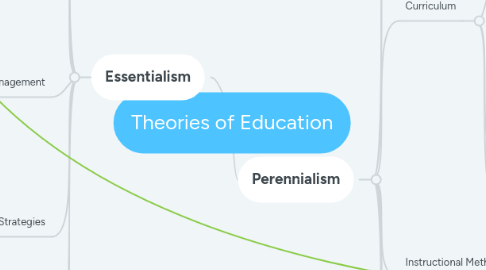
1. Essentialism
1.1. Purpose of Schooling
1.1.1. train the intellect
1.1.2. transmit the cultural heritage and traditions
1.2. Nature of the Learner
1.2.1. to become culturally literate
1.2.2. develop disciplined mind
1.3. Curriculum
1.3.1. critical body of knowledge all students should learn
1.3.1.1. that which contributed to human survival, productivity, civility, and political democracy
1.4. Instructional Methods
1.4.1. lecture
1.4.2. recitation
1.4.3. discussion
1.4.4. socratic dialogue
1.4.5. organized and paced so that students know what they should be learning to master
1.5. Classroom Management
1.5.1. show by teaching how one should act in society
1.5.2. aura of certainty
1.5.2.1. regularity
1.5.2.2. uniformity
1.5.2.3. reverence for moral rightness
1.6. Assessment Strategies
1.6.1. standard & frequent
1.6.1.1. should measure:
1.6.1.1.1. competency
1.6.1.1.2. mastery
1.6.1.1.3. accountability
1.6.1.1.4. performance
1.7. Role of the Teacher
1.7.1. present a teacher-centered philosophy
1.7.2. faith in accumulated wisdom of the past
1.7.3. subject-matter competency
1.7.3.1. ≠pedagogy
1.8. Usefulness to my own Classroom
1.8.1. teacher-centric easy to control classroom
1.8.2. makes me the boss
1.8.3. misses the part where students should be the focus and therefor also the opportunities for students to show mastery and competency in their learning
2. Perennialism
2.1. Purpose of Schooling
2.1.1. teach universal and eternal truths
2.1.2. cultivate rational intellect
2.1.3. develop spiritual nature of individual
2.2. Nature of the Learner
2.2.1. rational
2.2.2. valuable
2.2.3. worthy
2.3. Curriculum
2.3.1. strong liberal arts
2.3.1.1. philosophy
2.3.1.2. math
2.3.1.3. history
2.3.1.4. geography
2.3.1.5. political science
2.3.1.6. sociology
2.3.1.7. theology
2.3.1.8. languages
2.3.1.9. literature
2.3.1.10. humanities
2.3.2. content should develop intellectual skills
2.3.3. should emphasize the importance of teaching principles (which are unchanging)
2.4. Instructional Methods
2.4.1. didactic instruction
2.4.2. coaching
2.4.3. Socratic method
2.5. Classroom Management
2.5.1. discipline the student
2.5.1.1. train their will
2.6. Assessment Strategies
2.6.1. examination
2.6.1.1. objective
2.6.1.2. essay
2.7. Role of the Teacher
2.7.1. well educated
2.7.1.1. liberal arts
2.7.1.2. sciences
2.7.1.3. culture
2.7.2. intellectual coach
2.7.2.1. direct discussion
2.7.2.2. correct reasoning errors
2.8. Usefullness to my own Classroom
2.8.1. Curriculum
2.8.1.1. can help with intellectual skills I value
2.8.1.2. good place to start
2.8.2. Examinations
2.8.2.1. objective & subjective
2.8.2.1.1. diffferentiates for different learners
2.8.3. Discipline
2.8.3.1. training the will
2.8.3.1.1. good practie for classroom management
2.8.4. Role of Teacher
2.8.4.1. should model expected behavior of students
